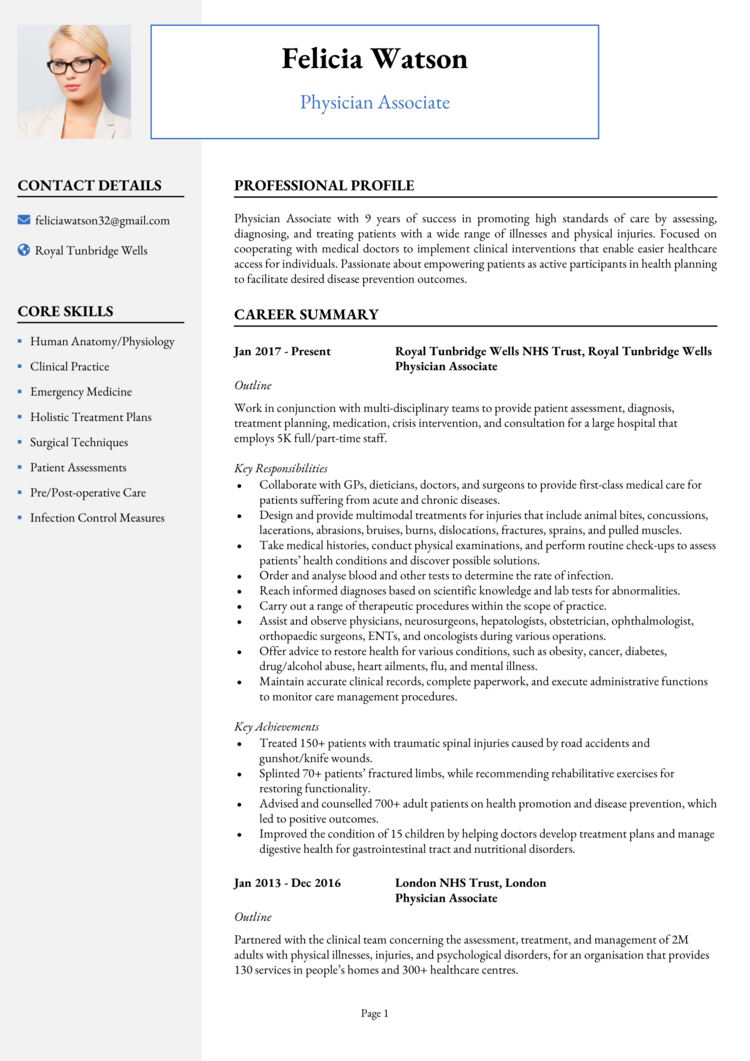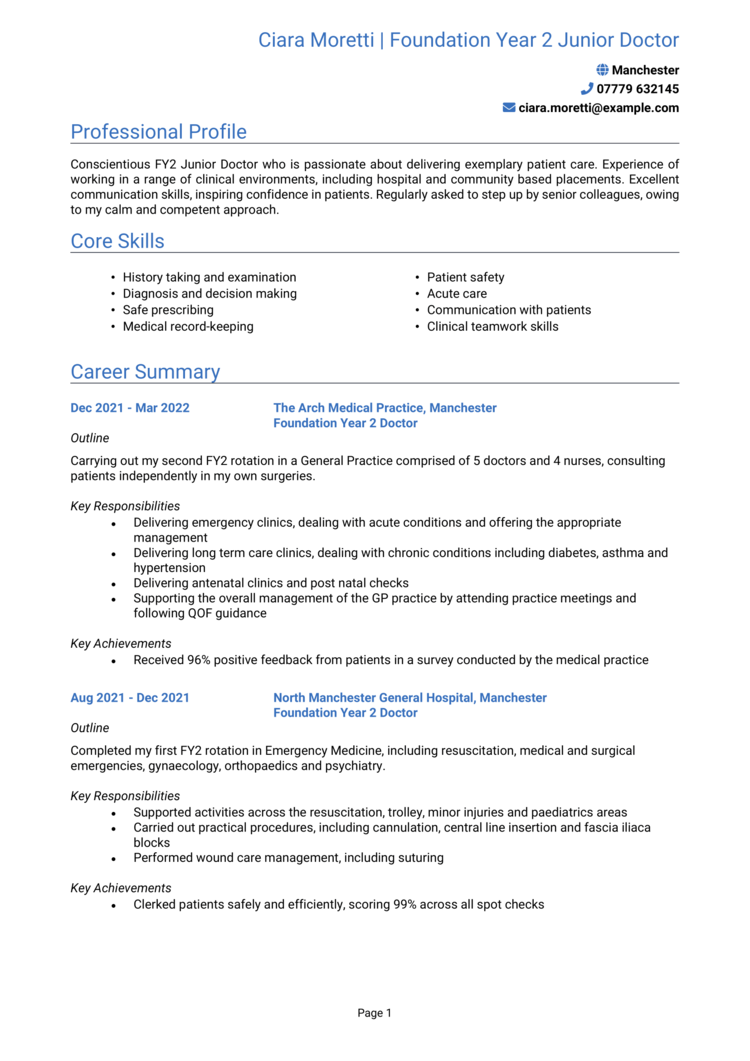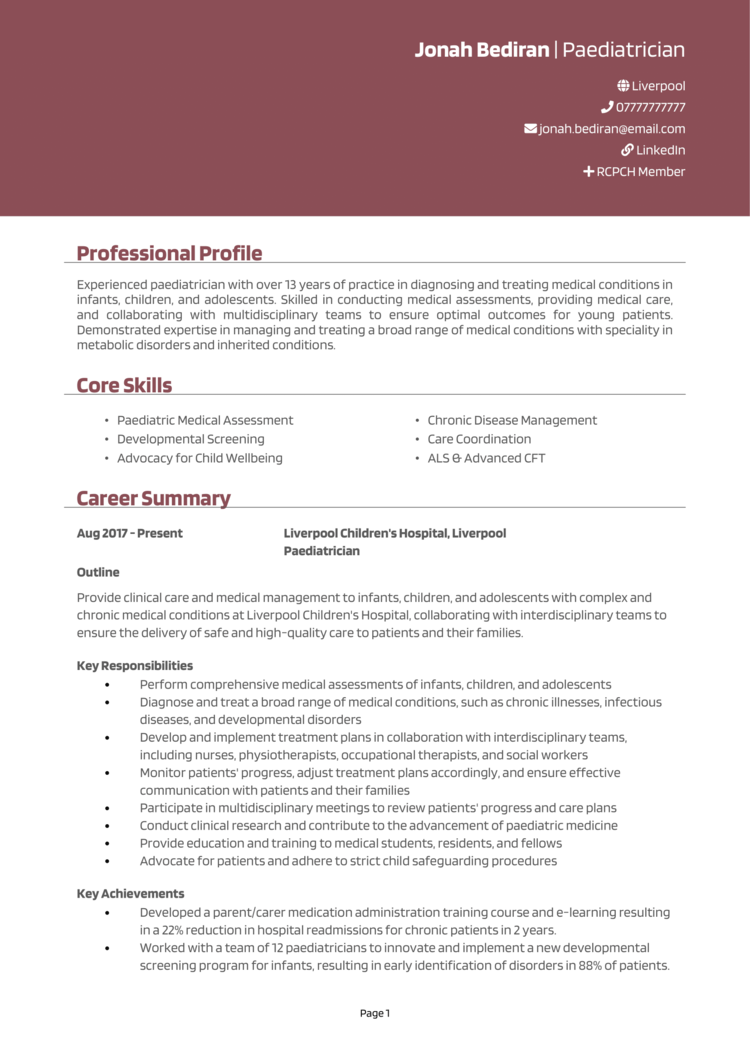Being a doctor is a demanding but rewarding career. Whether you’re working in a hospital, a clinic, or a specialist practice, your ability to make critical decisions and provide exceptional patient care is invaluable.
But before you can help patients, you need to get through the first critical assessment – your CV. This guide and its Doctor CV examples will help you craft a CV that highlights your medical expertise, patient care experience, and leadership abilities – so you can land your next role with confidence.
Doctor (GP) CV example

Physician Associate CV example

Junior Doctor CV example

Paediatrician CV example

Dermatologist CV example

How to write your Doctor CV
Learn how to create your own interview-winning Doctor CV with this simple step-by-step guide.
A great CV doesn’t just list your qualifications – it reflects the precision, dedication, and expertise that define you as a doctor.
Writing a CV just about filling in the blanks with job titles and degrees. Your CV is your professional case study – showcasing not just where you’ve worked, but how you’ve improved patient care, led medical teams, and advanced clinical practices. By the time you’re done with this guide, your CV will be as compelling as a successful treatment plan.
Doctor CV structure


A great doctor relies on precision and strong communication – your CV should reflect the same. If hiring managers can’t quickly see your specialisations and clinical experience, they’ll move on. A coherent and layout will save recruiters squinting to discern what it is that makes you the right candidate, so save them the effort.
Here’s the structure you should follow:
- Name and contact details – Display your contact details clearly at the top so employers can get in touch easily. Including a photo is entirely optional.
- Profile – Begin with a concise summary that highlights your expertise and what you bring to the role.
- Core skills – Highlight your strongest skills, such as diagnosis and treatment plans, that align with the role’s requirements.
- Work experience – Start with your most recent role and work backwards, showcasing achievements and patient outcomes.
- Education – Mention your medical degrees, certifications, and any training that supports your career path.
- Additional info – Include any additional details, like awards or hobbies, that highlight your skills or personality.
Doctor CV format


A cluttered CV is like an unclear medical report – hard to read and ineffective. Keep your layout clean, professional, and easy to navigate, as even the best doctors will be overlooked because of formatting mistakes.
Here are some tips to enhance your CV format :
- Bullet points – These help recruiters skim through your accomplishments quickly and easily.
- Divide sections – Break your CV into distinct sections with clear headings for smooth navigation.
- Use a clear and readable font – Use a simple, professional font and keep your layout uncluttered for maximum readability.
- No more than 2 pages – Keep it a concise length to maintain recruiters’ interest while still covering all the essentials.
How to write a Doctor CV profile


Your CV profile is your professional summary – a concise introduction that outlines your expertise in medicine. Outline your key qualifications, biggest strengths, and the experience that prove you’re the right fit for the role. You’ll need to hook them and quickly convey the tangible benefits of hiring you.
Doctor CV profile examples
Profile 1
Compassionate and detail-oriented Doctor with four years of experience in general practice, diagnosing and treating a wide range of medical conditions. Skilled in patient assessment, clinical procedures, and emergency care. Proficient in using electronic medical records (EMR) systems to track patient history and treatment plans. Dedicated to providing high-quality, patient-centred healthcare.
Profile 2
Results-driven Medical Doctor with three years of experience in hospital and outpatient settings, specialising in internal medicine. Adept at conducting patient examinations, interpreting diagnostic tests, and formulating treatment plans. Skilled in multidisciplinary collaboration and patient education. Passionate about improving patient outcomes through evidence-based medical practice.
Profile 3
Experienced Doctor with over six years of expertise in emergency medicine, managing acute and life-threatening conditions in high-pressure environments. Skilled in triage, advanced life support, and critical care procedures. Proficient in handling complex cases while coordinating with multidisciplinary teams. Dedicated to delivering prompt, high-quality medical interventions to improve patient survival and recovery.
What to include in your Doctor CV profile
Here’s what you should include:
- Specialist area – Whether you work in general practice, surgery, or as a physician associate, highlight your expertise.
- Clinical experience – Showcase your years in practice and key areas of patient care.
- Procedural expertise – Mention any advanced procedures or techniques you’re trained in.
- Leadership and teamwork – Demonstrate your ability to lead medical teams or collaborate with specialists.
- Patient-centred approach – Highlight your commitment to quality patient care and safety.
Core skills section


Your core CV skills section lets you quickly bullet point the key hard skills that recruiters scan for in a freshly-opened CV. Medicine requires a combination of clinical knowledge, problem-solving, and communication skills: if a skill doesn’t contribute to patient care, diagnosis, or treatment, it doesn’t belong here.
For roles focused on emergency medicine, emphasise crisis management and trauma care. If it’s a consultant role, focus on leadership, diagnostics, and treatment planning.
Best skills for your Doctor CV
- Patient Diagnosis and Assessment – Evaluating symptoms, conducting examinations, and diagnosing medical conditions.
- Medical Treatment Planning – Developing and implementing treatment plans tailored to patient needs and medical guidelines.
- Emergency and Acute Care – Managing urgent medical situations, stabilising patients, and providing life-saving interventions.
- Surgical and Procedural Skills – Performing minor surgical procedures, wound care, and other hands-on medical treatments.
- Pharmacology and Prescribing – Understanding drug interactions, dosage, and prescription guidelines to ensure safe medication use.
- Medical Research and Evidence-Based Practice – Analysing scientific studies and applying the latest medical advancements to patient care.
- Patient Communication and Counselling – Explaining diagnoses, treatment options, and preventive care in a clear and compassionate manner.
- Clinical Data Interpretation – Analysing lab results, imaging scans, and diagnostic tests to guide medical decisions.
- Preventive Medicine and Public Health – Promoting wellness, disease prevention, and lifestyle modifications for long-term health benefits.
- Interdisciplinary Collaboration – Working alongside nurses, specialists, and healthcare teams to provide comprehensive patient care.
Work experience


In the field of medicine, your work experience is vital in proving you know what you’re doing. Start with your most recent role and work backward, prioritising clarity over unnecessary detail.
Bullet points keep things concise, but don’t just list daily tasks – focus on moments that defined your expertise. Managed high-risk patients in critical care? Spearheaded process improvements in your department? These are the things that make you stand out.
And if you’re still early in your career? Your placements, rotations, and internships are just as valuable. Every doctor starts somewhere – what matters is how you showcase your growth and adaptability.
What’s the correct way to structure job history on your CV?

- Outline – Introduce the hospital, clinic, or practice you worked at, along with your role.
- Responsibilities – Go over your key tasks, such as diagnosing conditions, managing treatment plans, and handling emergency cases. Use action words like “diagnosed”, “treated”, and “managed”.
- Achievements – Walk through measurable outcomes, such as improved patient recovery rates, leadership in clinical teams, or research contributions.
Sample work experience for Doctors
General Practitioner | Oakwood Medical Centre
Outline
Provided comprehensive primary care services at a busy GP practice, diagnosing and treating acute and chronic illnesses while promoting preventive healthcare and patient well-being.
Responsibilities
- Conducted thorough patient consultations, assessing symptoms and medical history to make accurate diagnoses.
- Prescribed medications and developed personalised treatment plans for various medical conditions.
- Performed minor surgical procedures, including wound suturing and skin lesion removal.
- Provided health education and preventive care advice to improve patient well-being.
- Managed and updated electronic medical records to ensure continuity of care.
Achievements
- Reduced unnecessary hospital referrals by 25 percent through improved early diagnosis and management.
- Introduced a chronic disease management programme that improved patient compliance rates.
- Achieved high patient satisfaction ratings for thorough and compassionate care.
Junior Doctor | St James University Hospital
Outline
Worked across multiple hospital departments within a leading teaching hospital, delivering medical care, assisting senior physicians in patient management, and gaining hands-on clinical experience in diverse specialties.
Responsibilities
- Conducted patient assessments, including physical examinations, history-taking, and diagnostic interpretation.
- Monitored and managed inpatients under the supervision of consultants and senior doctors.
- Assisted in emergency procedures, including intubation, catheterisation, and wound care.
- Collaborated with multidisciplinary teams, including nurses, physiotherapists, and dietitians, to optimise patient care.
- Documented patient progress and treatment plans in accordance with hospital protocols.
Achievements
- Reduced patient wait times by 30 percent by streamlining admission and discharge processes.
- Recognised for excellent bedside manner and patient communication skills.
- Successfully managed a high caseload, ensuring timely and effective treatment for all patients.
Emergency Medical Doctor | City General Hospital
Outline
Provided urgent and life-saving medical care in the emergency department of a large NHS hospital, managing critical and trauma cases under high-pressure conditions while coordinating with multidisciplinary teams.
Responsibilities
- Performed rapid patient assessments and prioritised treatment based on severity of condition.
- Stabilised critically ill patients, administering resuscitation, intubation, and emergency drug therapy.
- Collaborated with paramedics and other emergency responders to ensure seamless pre-hospital and in-hospital care.
- Supervised junior doctors and medical students, providing training in emergency procedures.
- Maintained accurate patient records and ensured clear communication with inpatient teams for follow-up care.
Achievements
- Improved emergency response times by 20 percent through better triage system implementation.
- Successfully managed multiple trauma cases, reducing mortality rates in high-risk patients.
- Received recognition from senior consultants for clinical decision-making and leadership in high-pressure situations.
Education section


A strong academic background and foundational education is essential for a career in medicine. Ensure your medical degree, postgraduate training, and specialist certifications are clearly listed.
If you’ve completed specialist training in surgery, internal medicine, or another field, include it here to strengthen your application. Junior doctors should expand upon past qualifications, giving more detail on important and impactful modules and projects.
What qualifications do employers look for in a Doctor?
- MBBS/MBChB (Bachelor of Medicine, Bachelor of Surgery) – The fundamental medical qualification.
- MRCP/MRCS (Membership of the Royal College of Physicians/Surgeons) – Essential for specialist training.
- GP or Specialist Registration (GMC – General Medical Council, UK) – Required for practicing medicine in the UK.
- Diploma in Advanced Medical Training – Useful for consultants and senior roles.
- Additional Certifications (ATLS, ALS, BLS) – Demonstrates expertise in life-saving procedures and emergency care.





